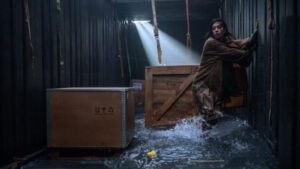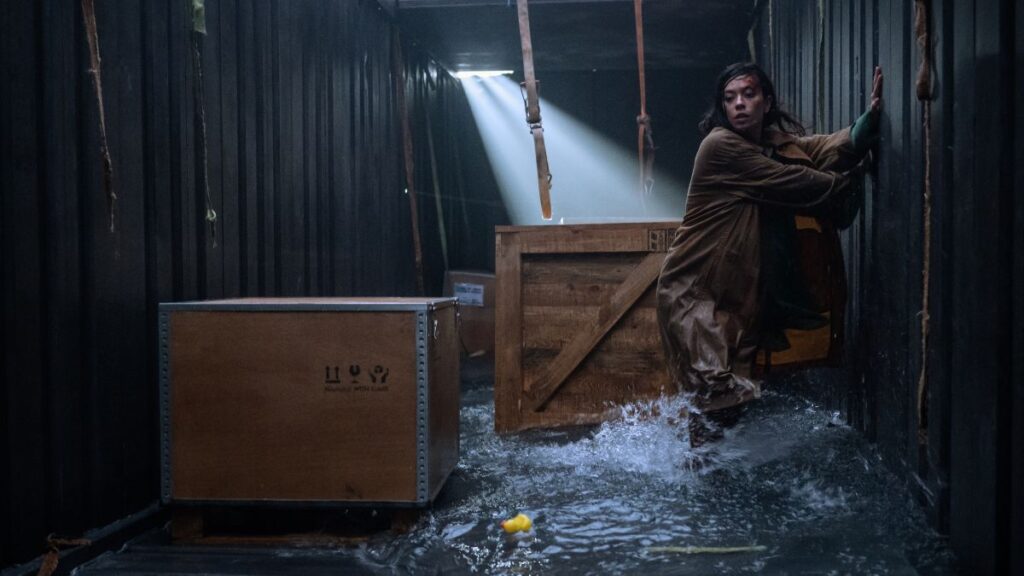Movie Info
Movie Info
- Director
- Albert Pintó
- Run Time
- 1 hour and 49 minutes
- Rating
- TV-MA
VP Content Ratings
- Violence
- 3/10
- Language
- 2/10
- Sex & Nudity
- 1/10
- Star Rating
Relevant Quotes
Now a man from the house of Levi went and married a Levite woman. The woman conceived and bore a son, and when she saw that he was a fine baby, she hid him three months. When she could hide him no longer she got a papyrus basket for him and plastered it with bitumen and pitch; she put the child in it and placed it among the reeds on the bank of the river. His sister stood at a distance, to see what would happen to him.
Yet it was you who took me from the womb; you kept me safe on my mother’s breast.

Director Albert Pintó’s film is a paeon to motherhood, a story in which a timid woman discovers an indomitable will to survive, not for herself, but for her new-born child who is totally dependent upon her. It is also one more of the many films detailing the dangers and difficulties of the millions of refugees fleeing their native lands because of persecution or war.
The story of Mia takes place in the near future when Spain’s government, known as “The Regime,” follows in the footsteps of the right-wing populist movement that has overtaken such other European countries as Hungary, and for a time, Poland. The government, faced with famine, has decided to reduce the population by rounding up pregnant women and their children and shooting them. Mia (Anna Castillo) and her husband Nico (Tamar Novas) desperately pay smugglers to transport them by a semi-trailer to a seaport where they can find a ship to take them to safety in Ireland, a country that they hear does not persecute refuges.
Mia is in a late term pregnancy, the pair hoping to rear their child in safety. Nico has to constantly reassure her when she complains about not being able to go on anymore. However, the pair are torn apart, with Nico forced into a second trailer. Terrified, they are powerless to do anything. At a checkpoint where government soldiers top the truck to inspect its contents, a soldier boards the trailer where he is not fooled by the partition behind which the passengers cower. Fortunately for her, Mia climbs up on a crate and so escapes the fusillade of bullets which the ruthless soldier fires into the partition. Only she, numb with terror, survives. The next thing she knows the trailer is loaded onto a container ship. The container is riddle with bullet holes through which she peers in an attempt to gain sight of her bearings. It is probably just as well that she does not see that the large letters on her container spell the Spanish word for “NOWHERE.”
A huge storm overtakes the ship, with Mia tossed to and fro within the container. Suddenly it and a host of other containers are tossed into the ocean. There are so many that we wonder if the ship itself was sunk. Bruised and battered, she sets about to examine the few crates within her container. Water is pouring in through the many bullet holes, so she knows she must do something to save herself from drowning. One crate contains hundreds of Tupperware containers. (Watch how these are included, not for just the humor of their seeming uselessness, but how Mia will find them useful later. Another example of “Chekov’s gun”—the playwright once saying that if you see a gun in a play’s first act, you can count on it being used in the next.) More immediately useful items are bottles of alcoholic beverages—she has brought in her backpack a bottle of water and a Snicker bar she and Nico has saved for a special occasion—and, thankfully for her present need, a roll of duck tape. She quickly starts plugging the holes with the tape, buying herself and her unborn child some time. She also still has her smartphone, which works sometimes, though its power is running low.
When she can feel birth pangs, her first panicky reaction is denial, “No, No, No…!” echoing how she had behaved while with Nico. But the child will not be denied, emerging while mother and container are being tossed about by the tumultuous sea. Of all the many screen births that I have seen, this must be the most harrowing! Up to this point we might well compare Mia to the Tom Hanks character in Cast Away, but his Chuck Noland had only himself to care for. Mia now has a tiny daughter entirely dependent upon her, and this factor transforms her from a whiner into a woman whose innate mother instinct, combind with her survival instinct, arouses her ingenuity. She names the newborn Noa. Given their circumstances, a fitting name indeed!
At first, she experiences frustration because she is unable to produce milk for the tiny crying creature, but after a day or two her breasts are producing milk, so she can feed her little one. But what about keeping herself alive, once she has consumed her meager supply of food and drunk all the water in her bottle? How she manages to replenish her supply of water and get out of the container reveals her ingenuity, the latter process a highly suspenseful one because the duck tape has come loose, and the sea water is flooding the container. In the open air she finds that catching fish is no easy task, until she…(Before this her acute hunger is so great that it drives her to eat—her placenta!) As if all this were not enough, she cuts her thigh on the jagged edge of her escape hole, thus requiring a painful remedy to the danger of bleeding to death.
Each of the scenes of Mia coping is harrowing, but the most heartbreaking sequence is when she manages to contact Nico on the smart phone, and she learns that he and his fellow escapees have been shot by soldiers. But at least the dying man has become informed that he is a father. When she places her phone so that he can speak to the infant, I suspect you will be as deeply moved as I was.
This is a power tale of survival, made all the more authentic because chief writer Indiana Lista based her fictional story on those of real-life refugees she has known. The spiritual journey that Mia follows, from timid, whiney wimp to that of ingenious survivor, fueled by her mother’s desire to protect her offspring, is truly inspiring. She is like the mother of Moses in the Exodus story, intent on protecting her infant from death—only instead of a papyrus basket, she uses those aforementioned Tupperware boxes to make sure that her child will stay afloat whatever happens to her.
This is a film well deserving of two hours of your time. Not only is it a thriller, but one that sheds light on the plight of so many victims fleeing from danger in today’s oppressive and war torn world—and one, unfortunately in which those living in host countries sometimes slander in their xenophobic rejection of newcomers seeking asylum.
This review will be in the Nov. issue of VP along with a set of questions for reflection and/or discussion. If you have found reviews on this site helpful, please consider purchasing a subscription or individual issue in The Store.

